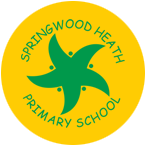| Intent | At Springwood Heath Primary School we aim to inspire in our pupils a curiosity and fascination about the world and its people that will remain with them for the rest of their lives. We wish to equip our pupils with knowledge about diverse places, people, resources and natural and human environments, together with a deep understanding of the Earth’s key physical and human processes. |
| Implementation (Overviews) |
|
| Early Years | |
|
|
A guiding principle of CUSP Geography is that each study draws upon prior learning. In the EYFS, pupils may learn about People, Culture and Communities or The Natural World through daily activities and exploring their locality and immediate environment. This is revisited and positioned so that new and potentially abstract content in Year 1 can be put into a known location and makes it easier to cognitively process.
Geography is learnt via EYFS (Early Years Foundation Stage) Implementation.
ELG (Early Learning Goal) 14, People, Culture and Communities:
ELG15, The Natural World:
|
|
KS1 |
|
|
|
Please see Knowledge and Skills Progression table. |
| Lower KS2 | |
|
|
Please see Knowledge and Skills Progression table. |
| Upper KS2 | |
|
|
Please see Knowledge and Skills Progression table. |
| Working Scientifically | |
| Lesson Design | |
|
|
An essential component to CUSP lessons is the systematic and coherent approach that we embed focusing on the six phases of a lesson.
|
| Knowledge Organisers | Children are provided with a knowledge and vocabulary-rich organiser at the start of each unit, with high-quality images or diagrams and key concepts which children are enabled to understand and expected to refer back to in order to remember. Children are confident in referring to this overview and know that they can find key knowledge in one place. The unit knowledge organisers are elaborated on by knowledge notes for each lesson. These contain the focussed learning question, key facts and images, and vocabulary for the lesson. Knowledge Organisers and Knowledge Notes are dual coded to provide pupils with visual calls to aid understanding and recall. |
| Knowledge Notes | Unique and innovative knowledge notes for each lesson are dual coded and rich in vocabulary. |
| Mapping of Knowledge within a unit | |
| Retrieval Practice | Core knowledge is defined and articulated across the geography curriculum through a focused teaching sequence that is coherent, interleaved and built around spaced retrieval practice. The BIG ideas maps help teachers and pupils see the complete learning sequence. |
| Vocabulary | Explicit vocabulary instruction is an integral component within CUSP Pedagogy and Practice. Key vocabulary is shown in the accompanying ‘Knowledge and Skills Progression’ table. |
| Impact
How do we know what children have learnt |
A guiding principle of the geography curriculum is that children become more geographically ‘expert’ with each study and grow a broadening and coherent understanding of the world, ensuring their geographical knowledge is not fragmented. Vocabulary, both specific and associated, is taught alongside and within geography units. Teachers will use the information gathered through formative assessment to address gaps and to provide additional challenge for children as required and appropriate. This is most effective when done immediately and at the point of learning. |
Geography Home Learning Websites
Online Geography Games:
https://world-geography-games.com/world.html
Fieldwork, environment & Map skills:
https://www.ordnancesurvey.co.uk/mapzone/
https://canalrivertrust.org.uk/explorers/teachers/virtual-learning
Geography & Science:
https://www.childrensuniversity.manchester.ac.uk/learning-activities/science/energy-and-the-environment/introduction/
http://www.earthlearningidea.com/home/Teaching_strategies.html
Useful Websites for Geography:
Primary Homework Help | Online Games For Kids – BBC Bitesize
https://classroom.thenational.academy/subjects-by-key-stage/key-stage-1/subjects/geography
https://classroom.thenational.academy/subjects-by-key-stage/key-stage-2/subjects/geography
Newsletters
28th February 2025
Friday 14th February
Friday 7th February
17th January 2025



